________________
Bon Dzogchen.
T.W.: Yes, while you are living, you are preparing the practice of death. Bardo practice, phowa practice, dream practice—all are in some sense a preparation for death.
L.M.: So that you will be able to let go, joyfully. You will feel joy, rather than fear or pain. Even if someone had a physical illness like cancer that was killing them, they could still through their practice, their attitude, be joyful.
T.W.: Sure, sometimes the pain you have is less than what you think of your pain. Sometimes people have a bad relation to their pain; their relation to the pain kills them, not the pain itself. Pain is just physical pain, it's natural. You are dying, it is death. But you are not struggling with death. It is a more peaceful pain then.
L.M.: In Bon, as in Buddhism, there is no deity, or spiritual guide, or guru, that meets you at death.
T.W.: Well, of course, when you are dying, there is always a support; there is always external support. Moreover, there is the teacher. We call it a neardeath introduction. Somebody says: O.K., you know, you're dying, and I am here to help you. You remember what you need to do for the process of death. Your elements are dissolving; you are losing your physical abilities; you are losing your body ability. Now you are dissipating your body heat. Your blood energy is disappearing; your breath is disappearing. Everything is dissolving.
L.M.: Can the teacher accompany the student in their death even if they are geographically apart?
T.W.: If somebody is somewhere else, we pray. We pray as a group. I pray for my students. I do a phowa practice that is able to transfer their consciousness to a higher level. That is what we do. If I am close enough, I try to help them by visiting in person.
L.M.: Part of this understanding death correctly is that consciousness in fact is not obliterated. The individual who dies just goes to a different level of existence.
66
Jain Education International
For Private & Personal Use Only
www.jainelibrary.org




